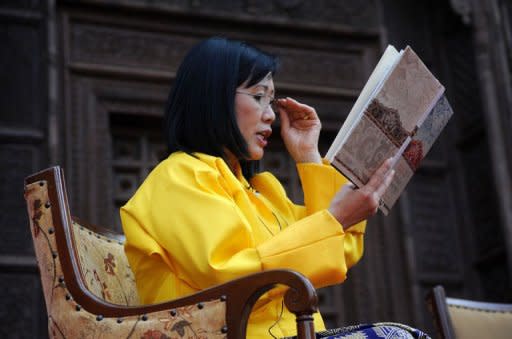Bhutan takes a dose of Gross Literary Happiness
South Asia's love of literature festivals has spread to the tiny Himalayan kingdom of Bhutan, which features in many an exotic travelogue but is pretty much a blank space on the global literary map. The Mountain Echoes Festival held this week in the Bhutanese capital Thimpu is part of a growing South Asian circuit that currently comprises thriving literary festivals in India, Nepal, Sri Lanka and Pakistan. The Thimpu event, which was first held in 2010, is by far the smallest, drawing daily crowds of just 300 or so to its community centre venue, to listen to 70 speakers and authors from the region and beyond. In the festival line-up, India's presence dominated, reflecting its literary powerhouse reputation in the region. Contemporary Bhutanese literary voices in what is still one of the world's most insular nations are few and far between. Sandwiched between India and China and with a population of 700,000, Bhutan is famously known for inventing "Gross National Happiness" -- a development philosophy that sees the government measure the mental well-being of citizens, not their material wealth. Historically, Bhutanese literature has been largely associated with revered religious scriptures written in the script of the national language Dzongkha and a rich but largely oral tradition of folk tales. "To a large extent, our literature has remained cloistered within the monastery fortress," Karma Phuntsho, a Bhutanese scholar and research associate at Britain's Cambridge University, said. The "Land of the Thunder Dragon", as Bhutan is also sometimes known, had no roads or currency until the 1960s and allowed television only in 1999 in a bid to shield itself from foreign influences. But since the 1960s, English has been the medium of education in Bhutanese schools, and is the language of choice for the members of the country's fledgling contemporary literary scene. "We're finding our voice in the English language, and in so doing we make our experience of Bhutan more accessible," said Karma Singye Dorji, a popular writer whose 2009 collection of stories and essays "Dreaming of Prayer Flags" was published abroad to critical acclaim. "In English, we can open a window on Bhutan to the world," he said. But Bhutan's grand old man of letters, Kuenzang Thinley, who has authored more than 60 books in Dzongkha, fears the growing cultural dominance of English is smothering the national language as a voice of expression, resulting in a loss of cultural identity. "With the spread of English through school education, literary activity in Dzongkha has been declining," Thinley told a session at the festival. Bhutanese schools devote only an hour a day to Dzongkha, which is similar to classical Tibetan, and while it is still widely spoken, it is done so with varying levels of fluency. Only a few Bhutanese can write Dzongkha easily -- mostly monks in Bhutan's many monasteries -- and its "viability as a national language against the onslaught of English is being tested more than ever", Phuntsho said. "It is difficult to preserve our own local language," acknowledged Lily Wangchuk, executive director of the Bhutan Media Foundation. "Most of us have been taught in English. I think TV has shaped and played a huge role in making English so predominate -- so much so that those who only speak Dzongkha sometimes feel inferior if they don't speak English," she said. Kunzang Choden, Bhutan's best-known woman novelist, said the most important thing was to foster a love of literature, no matter what language it was written in. "We're making the transition from an oral to a literary tradition but the distractions of TV and the Internet are intervening," said Choden, who writes in English and helps run reading programmes for youngsters. "The reading culture is still quite poor as the problem with us is our literature is mostly religious. We want to cultivate a love for books, a love for the feel of books that will stay with them all their lives," she added.



